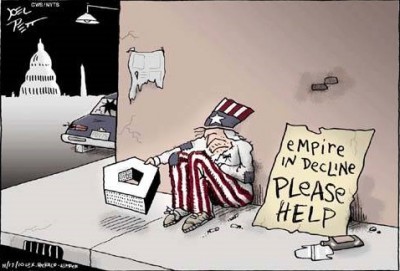US Imperialism Wages Permanent Warfare to Prevent Its Inevitable Collapse

The US has always been a warfare state. However, the character of US imperialist warfare has changed dramatically. For over two centuries, the US regime’s purpose for war, whether on indigenous peoples, Black people, or nations all over the world, was to expand the productive forces of capitalist exploitation. War preceded the vast profits accumulated from chattel slavery, land grab, and resource extraction in Africa, Asia, and Latin America. The foundation of white supremacy and capitalism allowed the US regime to consolidate its expansion despite episodes of periodic crisis. Recent events, alongside a steady fall in the rate of capitalist profit, indicate that US imperialist warfare no longer produces the dominance the system seeks. Now more than ever, US imperialism wages war to prevent its inevitable collapse.
US imperialism is in a state of retraction all over the globe. Cuba’s recent victory in negotiating itself off the so-called “terrorist” list is case and point. For almost six decades, Cuba’s revolution has been a beacon of hope in the midst of the misery imposed by US imperialism in Latin America. Cuba’s continued refusal to give up Assata Shakur and its socialist system, complete with free healthcare, education, and housing, has kept the island nation an enemy of the US state. Yet, beginning in December 2014, Cuba has negotiated the freedom of the Cuban 5 and struck a deal for more fraternal relations with Washington. These major victories for the Cuban revolution have setback US imperialism’s age old plan to institute a neo-colonial government. Although Cuba will always face attacks from US imperialism as long as it exists, such diplomatic victories bring much needed security in a period of hostility.
Cuba’s major gains in the diplomatic arena are emblematic of US imperialism’s decline in Latin America generally. Cuba and Venezuela’s leadership have spearheaded a movement to build an independent and integrated Latin America, especially through the institutions of UNASUR and ALBA. What once was US imperialism’s primary sphere of influence is no longer. To counter the revolt against neo-liberalism in Latin America, US imperialism has continued to pursue the overthrow of Venezuela, Ecuador, and other non-aligned nations, while expanding its military reach in Africa and Asia. In 2014, the US conducted 674 military operations throughout Africa and helped coordinate the destruction of socialist Libya in 2011. Furthermore, Washington has pursued a policy of destabilization alongside its Israeli and GCC allies, sponsoring terrorists in Syria while conducting a fraudulent war against ISIS in Iraq.
These developments are indicative of a geopolitical shift away from US hegemony. Even as US multinationals and financial banks flood the world with parasitic “markets that suck workers and nations dry, the crisis of imperialism has spurred the development of a multi-polar order. China and Russia’s increased relations along with the formation of the Asia Infrastructure Bank and BRICS have struck fear in the eyes of the shrinking US imperial economy. The War on Terror gave a facelift to US imperialism’s war of containment and plunder under these conditions. In the process, US imperialism has murdered millions in Iraq, Afghanistan, Libya, Syria, Somalia, and has militarized the borders of Russia and China borders in an effort to forestall the emergence of a global consensus on independent development.
Iran is seen by US imperialism as a major player in the development of a multi-polar world. US imperialism’s murderous military ventures seek to isolate and eventually overthrow Iran. In fact, NATO general Wesley Clark made this explicitly clear to Democracy Now’s audience in 2007 when he stated that Washington’s imperial design for the Middle East had Iran as its target. But Iran walked away from negotiations with the US and its allies with its sovereignty intact and S-300 missile systems from Russia as added defense. It appears that US led sanctions on the Islamic Republic and its proxy war in Syria and the region has, for the time being, failed to grant imperialism its ultimate wish of Iran’s demise. And with Russia’s agreement to distribute S-300’s to the Islamic Republic, the potential military intervention to achieve said wish is significantly reduced.
Just as Ed Snowden’s revelations didn’t stop the FBI from continuing to create the so-called terrorist attacks in the US as justification for a massive surveillance state, so too does US imperialism continue its worldwide march to war despite the geopolitical shift against it. Not long after Iran agreed to the nuclear deal put forth by imperialism, Washington sent two warships to Yemen to supposedly intercept “Iranian weapons shipments.” This is hardly representative of a move to ease relations. The reality is that US imperialism’s primary motivation for war is to secure the resources and labor necessary to accumulate Wall Street profits. However, in the case of Iran, Washington’s maneuvers represent a calculated choice to neglect the economic benefits that could come from trade with the oil-rich nation in favor of slowing independent development in the region, all at the behest of its Zionist and Gulf allies.
US imperialism is experiencing a permanent crisis. War is the system’s primary defense mechanism to fend off collapse. But such violent vulnerability will not produce a revolutionary and transformative situation on its own. For this to occur, the movement against racism, state sponsored-murder, and the heightened exploitation of the oppressed in the US must build a relationship of solidarity to the victims of US war all over the world. Serious political actors are tasked with bringing this about in the midst of an upsurge in fascism and a serious decline in principled anti-war politics in the US political landscape. However, the question of international solidarity cannot be avoided. In it holds a large piece to the puzzle of worldwide emancipation from imperialism.
Danny Haiphong is an organizer for Fight Imperialism Stand Together (FIST) in Boston. He is also a regular contributor to Black Agenda Report. Danny can be reached at [email protected] and FIST can be reached at [email protected]

